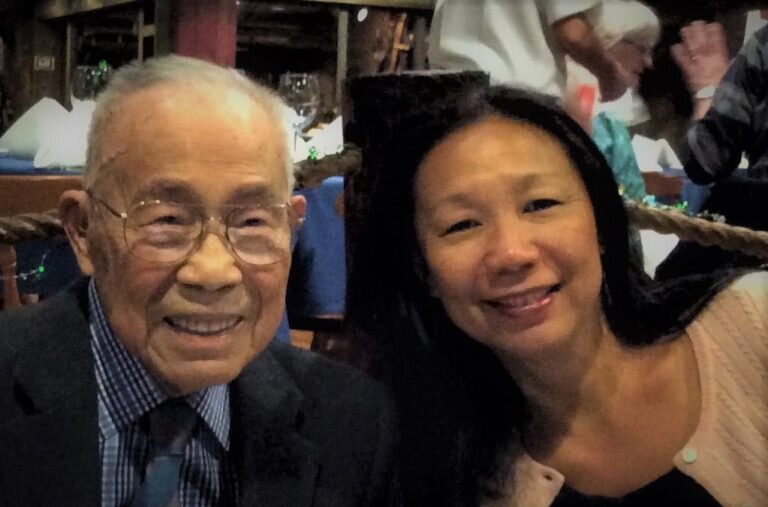The Turning Tides
By Cara Chang Mutert
My father raised me to believe in the power of humanity. As many of you who know me, my modus operandi is not typically to speak out about anything, except for learning to find peace within yourself.
But the recent passing of my father, his life, and the principles by which he lived, have given me an impetus to express my voice about the current social movement in our country. Because of the power of technology, more and more instances of unfathomable acts of blatant human indecency toward people of color, specifically Blacks, is finally being seen, acknowledged, and understood. Although the examples are endless, the death of George Floyd, who died four days before my father, marked a turning point after centuries of bigotry and inequality.
In my father’s final weeks, my family watched a documentary on the Chinese Exclusion Act, a law which prevented Chinese from immigrating to the U.S. from 1882 until 1943. Although, my father was too tired to watch, he was listening. Like most historic recounts of racial injustice, it was uncomfortable to watch. Before he went to sleep that night, although it was difficult for him to speak, in one of the few full sentences he spoke before his passing, my father said to my brother and I, “Do not seek revenge. All people should try to get along.”
Although he lived a full and blessed life, my father lived through his own experience of nearly 100 years of racial prejudice. In one instance, because of his Chinese descent, he was detained and questioned during the McCarthy Era for speaking to a person who may have been suspected of having ties to communist sympathizers at the time. Although he had left his birth country and family to gain freedom from this regime and had no affiliation with this group or person, but rather was just kind enough to listen, he was removed from his position due to the remote possibility his opinion might differ from what the administration wanted its public to believe in and adhere to. Hmmm….
Asian Americans have often been termed “good” immigrants, because a.) our skin was lighter, b.) obedience was ingrained behavior in our culture, c.) our cultural training in silence and subservience allowed us more opportunities in education and jobs. As Asians, we are the lucky ones. My mother told me the story of her using the “colored” bathroom in the 50s. She remembers a White woman who pulled her aside and told her she could use the “whites” bathroom. She thought, “Why? I am colored?”
For me, that illustrates my fairly confused Asian American experience. Living in predominantly White communities most of my life, I grew up thinking I was white, but feeling like a minority. So often, my friends have said to me, ‘I don’t think of you as not being white.” But the reality is, I have experienced life as a person of color. Throughout my life, when people would say something racially derogatory about any racial group, typically African Americans or Latinos, I’d feel a pang of discomfort and a flush of anger. Although my personal experiences with racism have been minimal compared to others, I have experienced, felt, and identify with the subtleties of racism. In the past this sensitivity was hard to explain to others. But with Black Lives Matter and the exposure of incidents that led to its long-delayed recognition, I think now the feeling seems more palpable to everyone.
In the same way woman have faced and worked to overcome inequality, we know that while outwardly progress has been made, real change due to entrenched conditioning has been slow. Racial equality has been even slower, despite the perception. With each generation, yes, there have been improvements. We went from legal slavery, internment camps and racial exclusion laws, to segregation of schools, drinking fountains, bathrooms, and public transport. While darker skinned people were equal enough to die in our wars, it took longer before people of color could vote, and as we’ve recently learned, to rise equally into the ranks of the military. The perception has been toward integration, yet judicial inequality has prevailed, along with subtler forms of suppression, including educational, occupational, and socio-economic oppression.
When Barack Obama was elected president, it was the first time I cried during an election. I felt a breath of hope that finally the tide was turning. But sadly, the division since then has grown stronger, between those that believe in humanity and those that stand by supremacy. We find ourselves now, however, in a unique position as a people, to heal the chasm and to move forward in a positive direction.
To be fair I, myself, am not free from prejudice. I have made mistakes and caught myself reacting from both my white and Asian perspectives. If we are to be really honest with ourselves, few of us are completely free of bias. In yoga, much of the work we do is to learn to see ourselves clearly, honestly and recognize both the good aspects of ourselves, as well as the areas where we could improve. By doing so, we can acknowledge unconscious patterns that may exist in our opinions, behavior, and reactions. And if we feel it appropriate, choose to make a shift towards growth and a deeper understanding.
Through this process, we can also choose to move past the mere intellectual understanding of racism and its existence. By turning the light of awareness inward, we can move toward greater insight and progress. We still have so far to go. So much more we all need to learn from and outgrow. To move forward to a place of true unity, a belief in the strength of humanity, and the right for all of us as one to live freely and die peacefully.
Forever in my heart,
Yuan Chun Eugene Chang, 1922-2020

